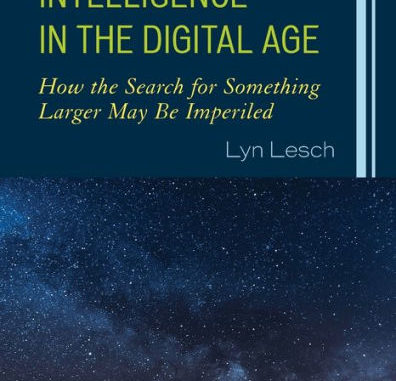
Intelligence in the Digital Age: How the Search for Something Larger May Be Imperiled by renowned educator Lyn Lesch is a brief book, but he manages to cover an enormous amount of theoretical territory in less than two hundred pages. It scarcely does his book justice to describe it as such, but the central thesis underlying Intelligence in the Digital Age is that the Internet and social media has undercut our neurological skills in significant ways and those negative consequences have even affected the nature of human consciousness in our modern world. It is Lesch’s fifth book and arguably his greatest work. In some ways, Intelligence in the Digital Age feels like the end result of the dozen years Lesch led the Children’s School he founded in Evanston, Illinois. One can easily imagine this work as a by-product of the observations he made during his tenure directing the school.
It does not stop there however. Lesch backs up his ideas with ample research, but the bulk of the book hinges on Lesch’s reasoning rather than relying on the aforementioned research. Lesch proves himself a lucid thinker throughout the whole of Intelligence in the Digital Age and, even if you disagree with a silver of his conclusion, you cannot argue he fails to make a strong case for his point of view. The neuroscientific evidence he harnesses in support of his points are extensive, but some may disagree outright with the seeming absolutism creeping in about the drawbacks he sees inherent in the digital age. Yes, many become addicted to the dopamine rush of technological engagement, but many do use the Internet in responsible fashion and experience no such drawbacks.
BUY THE BOOK: www.amazon.com/Intelligence-Digital-Age-Something-Imperiled/dp/1475854587
He is a polished writer, naturally, and his far reaching authorial experience takes full flight in this text. Lesch has a manner of writing about academically slanted subjects in an accessible fashion many other writers undoubtedly would envy. Intelligence in the Digital Age never reads like a stiff academic text; instead, it reads like an intelligent study with academic overtones. He quotes freely from academic, philosophical, and literary sources alike. The variety fueling this book is one of its chief strengths.
Another of its strengths comes from Lesch’s obvious investment in the topic. While Lesch never figuratively beats his chest in name of the “cause”, it is clear throughout Intelligence in the Digital Age that Lesch is a passionate advocate for the book’s topic. He has a sincere and human desire for readers to examine the topic at hand with the same seriousness he pays to the topic. The intellectual slant of the work never precludes Lesch from speaking with an impassioned voice without ever losing the unimpeachable reason and logic running throughout the work.
Intelligence in the Digital Age: How the Search for Something Larger May Be Imperiled certainly isn’t trusting of the digital world and its blandishments, but Lesch isn’t skeptical without reason. He offers ample justification, through both sheer rhetorical force and research, for why our world should exercise caution treating the digital age as the dawning of a new model for living. It’s a book well worth any serious thinker’s attention.
Cay Burton
